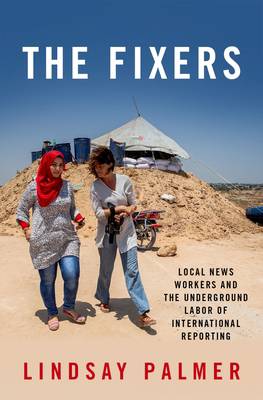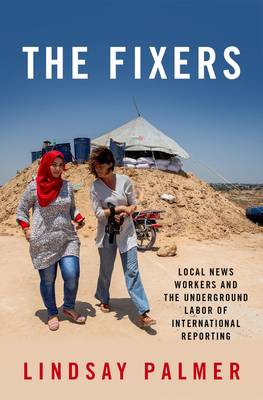
Wil je zeker zijn dat je cadeautjes op tijd onder de kerstboom liggen? Onze winkels ontvangen jou met open armen. Nu met extra openingsuren op zondag!
- Afhalen na 1 uur in een winkel met voorraad
- Gratis thuislevering in België vanaf € 30
- Ruim aanbod met 7 miljoen producten
Wil je zeker zijn dat je cadeautjes op tijd onder de kerstboom liggen? Onze winkels ontvangen jou met open armen. Nu met extra openingsuren op zondag!
- Afhalen na 1 uur in een winkel met voorraad
- Gratis thuislevering in België vanaf € 30
- Ruim aanbod met 7 miljoen producten
Zoeken
The Fixers
Local News Workers and the Underground Labor of International Reporting
Lindsay Palmer
Hardcover | Engels
€ 69,45
+ 138 punten
Omschrijving
News "fixers" are locally-based media employees who serve as translators, coordinators, and guides to foreign journalists in unfamiliar terrain. Operating in the shadows, fixers' contributions to journalism are largely hidden from us, yet they underpin the entire international news industry: almost every international news story we read today could not be produced without a fixer. Indeed, without fixers' on-the-ground skill and intimate knowledge of a territory, journalists would struggle to document stories unfolding in countries outside their own. Despite this, however, fixers remain one of the most under-protected and undervalued groups contributing to the production of news. Targeted by militant groups and governments, even by their neighbors, they must often engage in a precarious balancing act, bridging the divides between foreign journalists and the people who live and work in fixers' own communities. In this book, Lindsay Palmer reveals the lives and struggle of those performing some of the most important work in international news. Drawing on interviews with 75 fixers around the world, Palmer is the first researcher to illuminate fixers' own rich narratives, offering a glimpse of how difficult it is to play the role of cultural mediator, both in and out of conflict zones. A news fixers' is not simply administrative; rather, the fixer's engagement with the story is editorial and, more importantly, cultural. Each task that a fixer takes on is a creative effort at mediating between different lived experiences of race, ethnicity, gender, sexuality, religion, politics, community, and nation. Ultimately, The Fixers offers a different picture of international reporting than most people are accustomed to seeing: one that is more collaborative, more contested, and more fluid in its understanding of "truth" in a global, cross-cultural context.
Specificaties
Betrokkenen
- Auteur(s):
- Uitgeverij:
Inhoud
- Aantal bladzijden:
- 240
- Taal:
- Engels
Eigenschappen
- Productcode (EAN):
- 9780190680824
- Verschijningsdatum:
- 30/07/2019
- Uitvoering:
- Hardcover
- Formaat:
- Genaaid
- Afmetingen:
- 163 mm x 236 mm
- Gewicht:
- 453 g

Alleen bij Standaard Boekhandel
+ 138 punten op je klantenkaart van Standaard Boekhandel
Beoordelingen
We publiceren alleen reviews die voldoen aan de voorwaarden voor reviews. Bekijk onze voorwaarden voor reviews.











